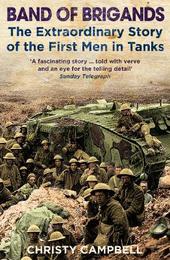
|
Band of Brigands: The First Men in Tanks
Paperback / softback
Main Details
| Title |
Band of Brigands: The First Men in Tanks
|
| Authors and Contributors |
By (author) Christy Campbell
|
| Physical Properties |
| Format:Paperback / softback | | Pages:384 | | Dimensions(mm): Height 198,Width 129 |
|
| Category/Genre | British and Irish History
World history - from c 1900 to now
First world war |
|---|
| ISBN/Barcode |
9780007214600
|
| Classifications | Dewey:940.41241 |
|---|
| Audience | |
|---|
|
Publishing Details |
| Publisher |
HarperCollins Publishers
|
| Imprint |
HarperPerennial
|
| Publication Date |
1 September 2008 |
| Publication Country |
United Kingdom
|
Description
The dramatic story of the men who fought a new and terrifying kind of war amidst the carnage of the trenches in World War I: the British pioneer volunteers who were the first tank-men into battle. Inspired by a visit to northeast France to witness the excavation of a remarkably intact First World War tank from beneath a suburban vegetable plot near the town of Cambrai, Christy Campbell - then defence correspondent of the Sunday Telegraph - began to piece together the little-known story of the young men who formed the British Tank Corps. Very few of them had been professional soldiers; they were motoring enthusiasts and mechanics, plumbers, motorcyclists, circus performers and polar explorers. One officer declared: 'I have never seen such a band of brigands in my life.' They had trained in conditions of great secrecy in the grounds of a mock-oriental stately home in East Anglia and were originally known as the 'Heavy Branch, Machine Gun Corps'. The word 'tank' itself was deliberately chosen to mislead. Men in tanks saw the face of battle at its most brutal. Their task was to crush and burn the enemy out of his fortifications, and to carve a path for the infantry so they could finish the job with bayonet and grenade. Captured tank crews were beaten up or sometimes shot out of hand by the Germans. They fought in their stifling armoured boxes packed with petrol and explosives, aware that at any moment a shell-hit might incinerate them all. Christy Campbell has combed contemporary diaries and letters and later recollections to tell properly for the first time the robust yet harrowing story of how the first men in tanks went to war. The time frame is 1916-18, with a coda on how German blitzkrieg ideas developed from an English root.
Author Biography
Christy Campbell is a writer, journalist and former defence correspondent and feature writer for the Sunday Telegraph, which he joined on the eve of the first Gulf War. He is the author of The Maharajah's Box, Fenian Fire and Phylloxera: How Wine was Saved for the World.
Reviews'A fascinating story...told by Christy Campbell with verve and an eye for the telling detail.' Sunday Telegraph 'Continuously interesting, so much so that one has to remember that for almost all the 1914-1918 war, tanks were a sideshow.This is the story of vision, false starts, blunders, obstinancy, obstructionism, determination, perseverance, quarrels and courage.' Daily Telegraph 'A military historian of the first rank ! a completely satisfying investigation that is both chilling and startling' Len Deighton 'A fascinating book' Daily Mail 'Wonderfully entertaining.' BBC History Magazine 'Campbell is to be applauded for producing a book that portrays life in the tank corps so vividly while guiding the reader painlessly through a morass of technical information.' THE Book Magazine Praise for Phylloxera: 'An entertainingly educational story of scientific exploration, political filibustering, profiteering skulduggery and a disaster that was nearly total! This is not just a book for wine buffs. An intoxicating read.' Peter Millar, The Times 'Such are Christy Campbell's superb storytelling skills that, notwithstanding my woeful ignorance of science, botany and viticulture, I found myself utterly hooked on this fascinating piece of social history.' Hugh Massingberd, Daily Telegraph 'Phylloxera is a rattling good read; the author handles scientific material with such a nimble touch that at no point was I overcome by the onslaught of entomological detail.' Giles MacDonogh, Literary Review Praise for Fenian Fire: 'Christy Campbell has come up with a genuine historical scoop! In a superb piece of historical detective work, Campbell has pieced together every element of the conspiracy on both sides of the Atlantic, from the prime minister's house in St James's to the Islington garret where the "dynamitards" were arrested in November 1887! It was a classic case of an agent provocateur sting.' Andrew Roberts, The Times 'Campbell has uncovered an extraordinary web of personal and political intrigue! an enthralling tale! the pace never slackens! Particularly good is his account of the origins of Irish revolutionary nationalism! To tell this involved story against the backdrop of bureaucratic bickering, revolutionary intrigue and clandestine meetings between spies and informers is both original and clever. Campbell is making this type of breezy investigative history his own.' Andrew Lycett, Sunday Times 'The "jubilee plot" is such a bizarre episode that I would regard it as the product of a febrile imagination had Christy Campbell not documented sufficient evidence to remove all reasonable doubt! From Mexico City to Liverpool and from the House of Commons to Chicago coroner's court, the story moves at the pace of the best sort of adventure story. All the Boy's Own Paper ingredients are there! colourful characters and compelling story! Its account of Fenian organisation and activity makes a real contribution to nineteenth-century history.' Roy Hattersley, Observer
|